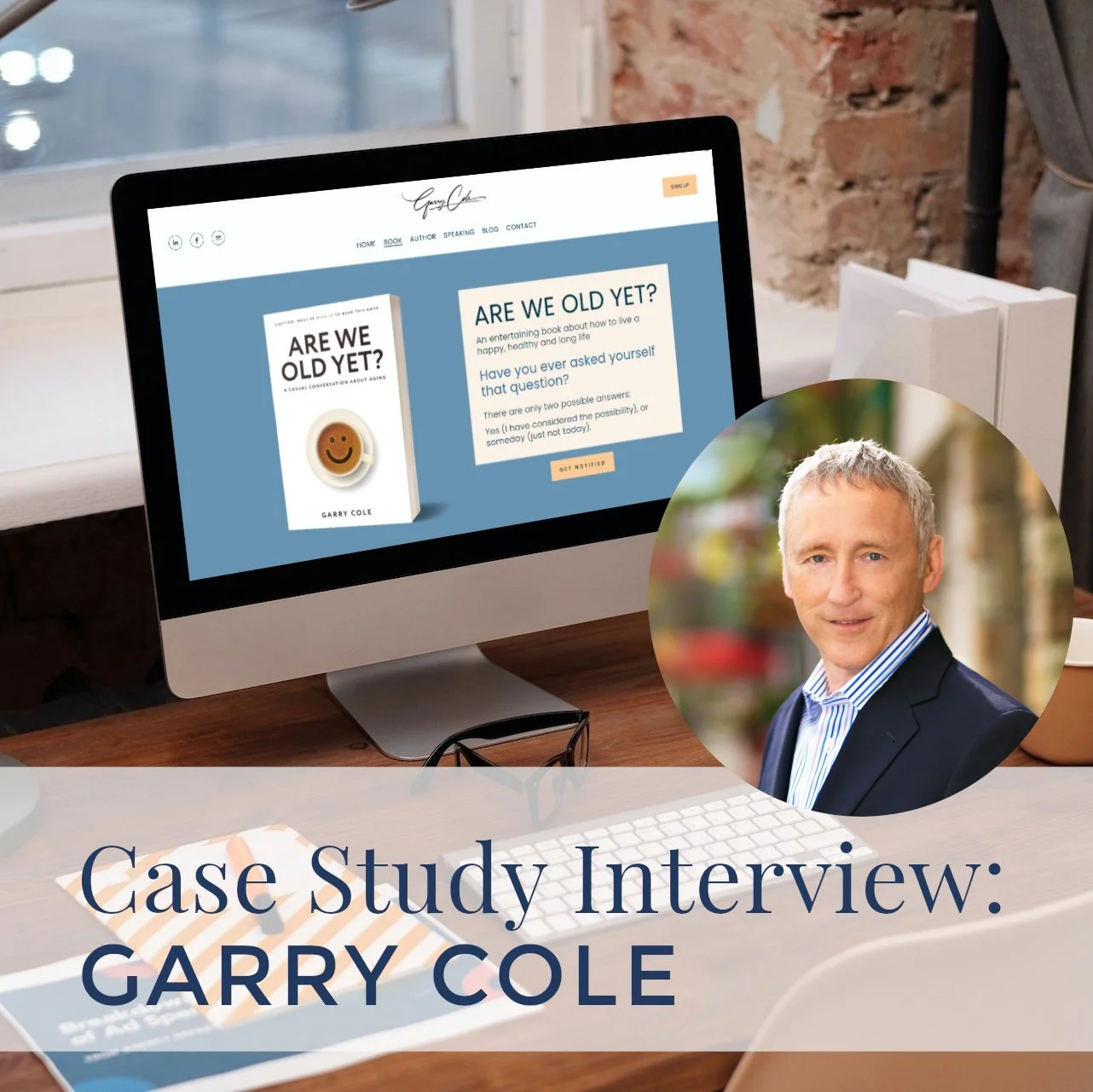How to Bring More Traffic to Your Author Website
• This article contains affiliate links •
Here’s a question that comes up a lot when I speak with writers and authors:
Assuming you’ve managed to build a great author website, how do you increase the likelihood that your readers will visit?
Below are 23 of my top traffic-building tips, followed by a friendly reminder of quality over quantity.
23 Ways to Get More Author Website Traffic
Make sure you’ve added your author website to the back matter (and back cover) of every book, including a compelling reason why a reader should come visit. If your book is nonfiction, offering a related resource (like a free checklist or workbook) is especially powerful.
Related: 33 reader magnet ideas for authorsCheck that your author website is listed in all of your online profiles, including social media, Goodreads, and member-only groups. If you’re writing a guest article or a regular column, pay attention to your short bio, and make sure your link is included.
Related: author website domain name tipsAdd your website link to your email footer, too. Don’t forget, in your standard out of office response, you can suggest people check out your website while you’re gone, especially if you have a FAQ section that can help them.
Don’t forget the physical world: do you have bookmarks and business cards? Get your website added to those. Do you send holiday cards? The same applies. You can even stick magnets on your car, raising your author profile while you’re out and about.
When you leave a thoughtful comment on a blog that’s related to your topic area, look for the opportunity to include your website URL. But don’t spam other people’s content with your link, without engaging in a meaningful way. If you happen to have a blog post that answers a question being asked, even better.
Collaborate with other authors (or other experts in your industry). Form a mutually supportive relationship, then ask if you can share a useful resource with their audience.
Newsletter swaps and book bundles with other authors also fall under the category of “borrowing” an audience. BookFunnel is one tool that makes group author promotions easy.
Ask your readers what content they would like to see on your author website, and gradually add it. You might find that they want book club discussion questions, character back stories, or behind-the-scenes glimpses. If you’re a nonfiction author, look at the questions you receive frequently, to know what content to create.
Similarly, make sure your website is well-designed, up to date, and easy to navigate. Not only do you want people to visit your website, but you want them to come back, and ideally tell others.
Check for the small number of deadly website sins that will cause some browsers to block you. The most common snag is that your website is old and listed as http instead of https (a sure sign that an update is overdue). However, if your site looks terrible on mobile or has dozens of broken links, Google will typically push you further down the listings.
Related: Website Terminology: Author's GuideWhen you’re interviewed on a podcast, almost every host will invite you to tell listeners how they can connect with you and find out more. This is the ideal moment to mention (or repeat) your website name. And remember, you’re more likely to land that podcast interview if the host checks you out and finds a professional, credible website in the first place.
I don’t believe that every author should aim for organic search engine traffic, but, especially if you write nonfiction and you have plenty of relevant content on your website, this is an area you should explore.
Related: Best SEO tools for beginnersIf you’ve made significant website updates, submitting your sitemap to Google is worth it.
Here’s how to do this, if you have a Squarespace websiteSimilarly, paid advertising is not for the faint-hearted. While, typically, you’d be running Amazon ads (directing traffic to your Amazon book listing), there might be times when you would run social media ads with your website as the destination.
Note: I’m not an ads specialist, so please be cautious before jumping into paid advertising.Once you have established an audience, selling books directly from your website can be a powerful reason for readers to visit. You can offer a book signed personally by you, or simply let them know that they are supporting you, by buying direct. Don’t forget to remind them that signed books make great gifts!
Over time, explore and pay attention to the analytics for your author website, and see where your current traffic is coming from (for example, social media, search, referrals, or direct). This can give valuable clues for where you’d like to focus your efforts. Squarespace has an in-built analytics tool that is easy to use.
If you send a regular author newsletter, make sure at least some of your links bring people back to your website to learn more. Check that your author website is linked in the footer of every newsletter that you send. If your name is at the top, link that too.
When you publish a new blog post (or even a new website page), share it on your social media account(s) and invite people to take a look and comment.
Talking of social media, from time to time, it’s fine to remind people that they can find full and up to date information at your website. When sharing your website link, an attractive mockup image will have better results than text alone.
Related: My favorite mockup toolsMake your blog posts easy for readers to share. This isn’t (yet) an inbuilt feature of Squarespace blogging, but it’s easy to configure:
How to add social share buttons to a Squarespace blogUse your website to publish interviews with other authors or industry experts whom your readers would find interesting. Ask each interviewee to help spread the word by sharing the link with their own audience. The Squarespace blogging module is ideal for this kind of material. And hopefully, you’ll make some wonderful new connections.
Related: Your Squarespace author blog: top tipsOccasionally, consider running a reader giveaway, where the answer to a quiz question can be found on your website. A few intrepid authors also ask readers to let them know of any website typos, in return for a prize.
Check in with the professionals who helped you put your author website together, like your photographer, copywriter, and website designer. If they haven’t yet shared it, they’ll often be happy to help spread the word. I always love to brag about my clients and their successes, since it reflects well on me too.
Other words of encouragement
Does sharing your author website bring up doubts about it not being good enough, or that you’re not a “real” author yet?Remember that sharing a simple website, or even the link to your coming soon page, is an important step and great for building courage gradually. I’m a huge believer that a simple, elegant, one-page author website is much better than nothing.
Take heart: it’s a long game. During the first ten years after I published my debut novel, I gathered over 1,000 Amazon ratings. But, I repeat, that took ten years. Few authors truly experience overnight success.
Even though your website visitor numbers might not be huge, I believe it’s more important to attract the right people in modest numbers, instead of masses of visitors who are not actually a good fit for your work. For example, just one person who’s on the planning committee for a conference in your genre could open exciting doors for you, and ultimately be “worth more” than a thousand fleeting visits.
But wait!
Although the question of getting more author website visitors comes up time and again, I would argue this isn’t actually your true goal. Instead, I would assert that you want these visitors to take action. More on that next time!
Conclusion
Thoughtful, steady tactics can get more of the right visitors to check out your author website. Remember it’s a long game: build a quality website, share it respectfully and diligently, and make sure you’ve set it up to prompt the right action when people arrive.
•
Want to give Squarespace a try? Save 10% off your first subscription of a Squarespace website by using the code PAULINE10
•
Would you like me to design and build your Squarespace website?
A high quality, truly professional website makes promoting your work so much easier. And you’re likely to feel more confident in doing so. As a professional specializing in strategic websites for authors and solopreneurs with books, I’m an expert in the features you need for a website that delights your audience and gets business results. If you’d like niche expertise, top quality design, and your technical headaches solved, consider hiring me.
After careful preparation together, I’ll design, build and launch your site in (usually) 2-3 weeks. Learn more, and then schedule a complimentary chat!
Other resources for your author website strategy
Amazon KDP Policies: External Links in Your Kindle Books
Save 10% off your first subscription of a Squarespace website by using the code PAULINE10








